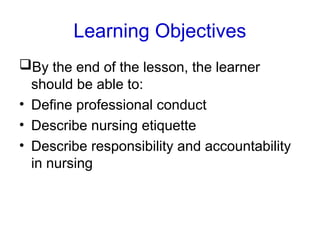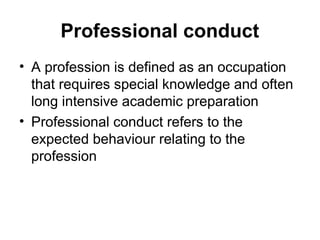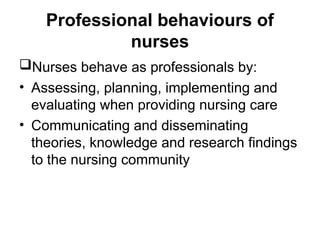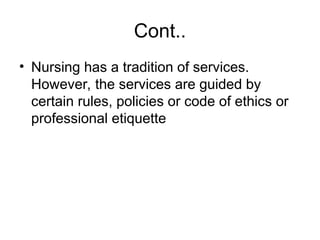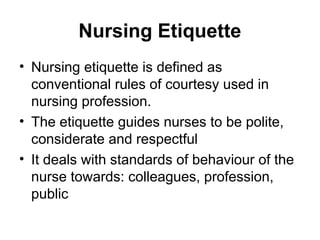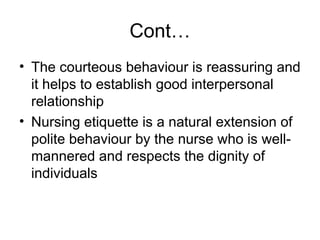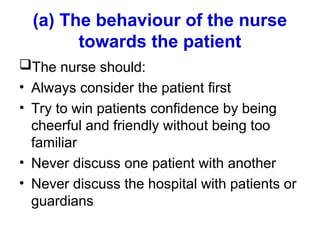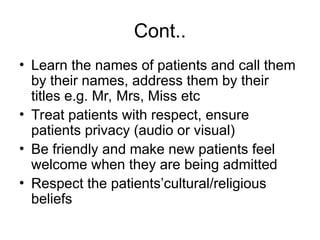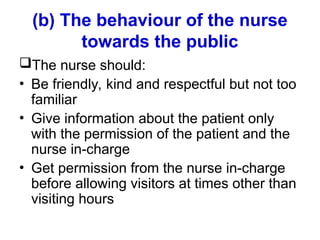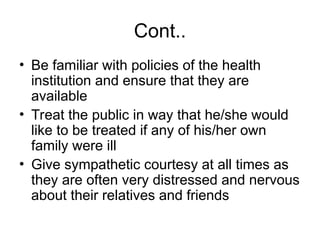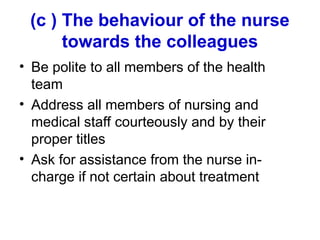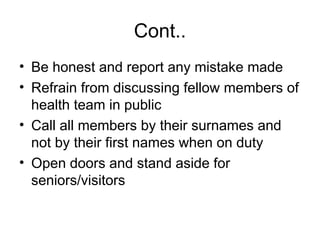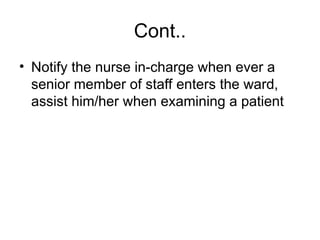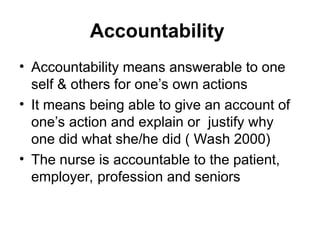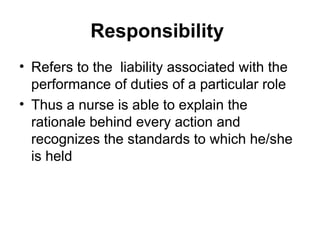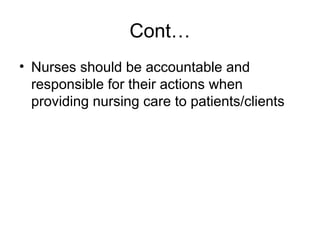PROFESSIONAL CONDUCT IN REGISTERED NURSING .ppt
- 2. Learning Objectives ?By the end of the lesson, the learner should be able to: ? Define professional conduct ? Describe nursing etiquette ? Describe responsibility and accountability in nursing
- 3. Professional conduct ? A profession is defined as an occupation that requires special knowledge and often long intensive academic preparation ? Professional conduct refers to the expected behaviour relating to the profession
- 4. Professional behaviours of nurses ?Nurses behave as professionals by: ? Assessing, planning, implementing and evaluating when providing nursing care ? Communicating and disseminating theories, knowledge and research findings to the nursing community
- 5. Cont.. ? Nursing has a tradition of services. However, the services are guided by certain rules, policies or code of ethics or professional etiquette
- 6. Nursing Etiquette ? Nursing etiquette is defined as conventional rules of courtesy used in nursing profession. ? The etiquette guides nurses to be polite, considerate and respectful ? It deals with standards of behaviour of the nurse towards: colleagues, profession, public
- 7. ContĪŁ ? The courteous behaviour is reassuring and it helps to establish good interpersonal relationship ? Nursing etiquette is a natural extension of polite behaviour by the nurse who is well- mannered and respects the dignity of individuals
- 8. (a) The behaviour of the nurse towards the patient ?The nurse should: ? Always consider the patient first ? Try to win patients confidence by being cheerful and friendly without being too familiar ? Never discuss one patient with another ? Never discuss the hospital with patients or guardians
- 9. Cont.. ? Learn the names of patients and call them by their names, address them by their titles e.g. Mr, Mrs, Miss etc ? Treat patients with respect, ensure patients privacy (audio or visual) ? Be friendly and make new patients feel welcome when they are being admitted ? Respect the patientsĪ»cultural/religious beliefs
- 10. (b) The behaviour of the nurse towards the public ?The nurse should: ? Be friendly, kind and respectful but not too familiar ? Give information about the patient only with the permission of the patient and the nurse in-charge ? Get permission from the nurse in-charge before allowing visitors at times other than visiting hours
- 11. Cont.. ? Be familiar with policies of the health institution and ensure that they are available ? Treat the public in way that he/she would like to be treated if any of his/her own family were ill ? Give sympathetic courtesy at all times as they are often very distressed and nervous about their relatives and friends
- 12. (c ) The behaviour of the nurse towards the colleagues ? Be polite to all members of the health team ? Address all members of nursing and medical staff courteously and by their proper titles ? Ask for assistance from the nurse in- charge if not certain about treatment
- 13. Cont.. ? Be honest and report any mistake made ? Refrain from discussing fellow members of health team in public ? Call all members by their surnames and not by their first names when on duty ? Open doors and stand aside for seniors/visitors
- 14. Cont.. ? Notify the nurse in-charge when ever a senior member of staff enters the ward, assist him/her when examining a patient
- 15. Accountability ? Accountability means answerable to one self & others for oneĪ»s own actions ? It means being able to give an account of oneĪ»s action and explain or justify why one did what she/he did ( Wash 2000) ? The nurse is accountable to the patient, employer, profession and seniors
- 16. Responsibility ? Refers to the liability associated with the performance of duties of a particular role ? Thus a nurse is able to explain the rationale behind every action and recognizes the standards to which he/she is held
- 17. ContĪŁ ? Nurses should be accountable and responsible for their actions when providing nursing care to patients/clients

